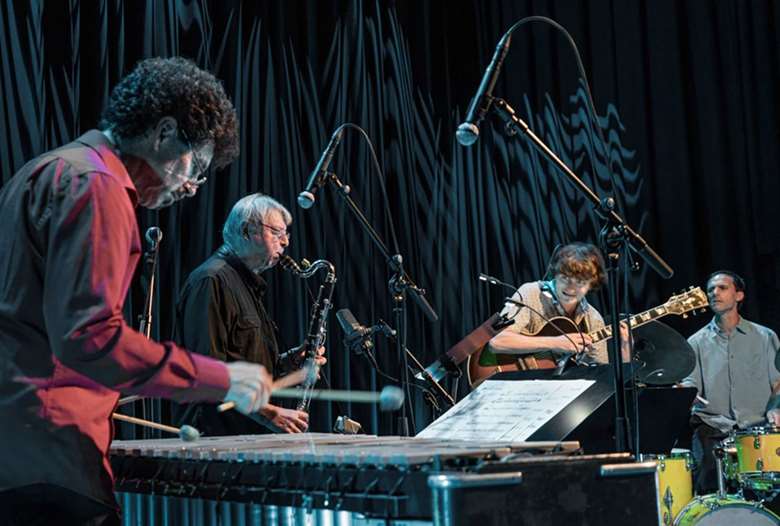John Surman brings Words Unspoken band to Manchester Jazz Fest
Robert Beard
Monday, June 3, 2024
The Brit jazz multi-reed maestro brings his new band and new music to the RNCM

On ECM’s website the note about John Surman’s most recent ECM album suggests that the title Words Unspoken – “alludes to the instant musical understanding found by the members of this nimble quartet.” The quartet certainly turned out to embody that understanding and, amongst many other things, respond to each other nimbly on this first (and sadly rather rare) British date at the estimable Manchester Jazz Festival. But John Surman’s brief comment about the title during the gig suggested an additional interpretation. Unspoken Words were, he said, a way of describing the meaning that each of us finds when listening to music.
If that meaning were to be spoken, rather than left unspoken, about John Surman’s music – and about this concert in particular – then it would need the combined skills of a dozen of the finest poets to do it justice. Reviewers, not known for their poetry, would surely be wise to leave their own impressions of such sublime music unwritten as well as unspoken. But needs must – so what follows is simply one person’s prosaic response to the indescribable.
The quartet members - drummer Thomas Strønen, vibraharpist Rob Waring and guitarist Rob Luft – are perfectly chosen by John Surman to interpret his music. Capable of meeting and enhancing every mood and nuance of the compositions, in delicately written passages or extended open sequences of collective improvisation, at times their performances almost seem like an (improvised) orchestral version of Surmans’s multi-layered solo recordings.
The leader’s unmistakable, inimitable, unique sound on soprano saxophone – a pellucid, keening voice, which gives the impression that it’s yearning for something or somewhere just out of reach, prompts the thought that this long-term exile from his native Devon is speaking ‘home thoughts from abroad’ – words unspoken about his homeland in his solos as much as in his clearly English folk – and church – influenced compositions. Whereas, on bass clarinet, he sounds as if he has now reached home, sitting by the fire in a cottage hunkering down in a valley on the edge of Dartmoor.
Rob Luft, a guitarist who plays outside of any usual concept of the guitar in jazz (or in any other kind of music) moves effortlessly between single line melodies, sound-scaping chords and subtleties of volume, and, just occasionally, a deep twang that seems to be channelling John Surman’s other guitar partner Terje Rypdal’s expressed enthusiasm for Hank Marvin.
Thomas Strønen’s drumming is subtle, spare, delicate and seemingly understated but always there to support and enhance the rhythm and mood of each piece. He moves constantly around the kit, placing the perfect touch on exactly the right instrument – even on the massive orchestral bass drum which (surely) no other percussionist could ever have played with such restraint in the course of a 90 minute set.
On vibraharp, Rob Waring duets with Thomas Strønen, weaves garlands of notes around the saxophone, leads the group’s ascents to crescendo while also sharing the collective understanding of each passing mood – by turns reflective, joyful, gentle, windswept, contemplative (and more, which we must leave the poets to enumerate).
The musicians display an obvious pleasure and delight in the music and in each other’s playing, none more so than John Surman himself, swaying, smiling and gently dancing along to a Rob Luft solo (as Luft himself seems to dance through almost every piece). In the audience, watching such pleasure and listening to such exquisite, masterly compositions and performances, we sit and wonder how to capture even a fleeting sense of what we are hearing in words, before simply giving ourselves permission to leave words behind and allow our senses to be enfolded in the shared experience of the music.
Finally, after a joyful journey through the rise and fall of an ever-changing pastoral landscape (with an excursion on soprano that led us to believe that John Surman might be Tavistock’s only known muezzin) the maestro brings us back, this time in actual words, with an overt West Country reference. Introducing the encore (demanded by a wildly enthusiastic and completely entranced audience) Surman says the gig’s been “proper job” and he’s “bin havin’ a lovely time up ‘ere, my luvver” and that they’ll play the nautically titled ‘Belay’. The quartet take their musical trawler out into the swelling tides off Plymouth Hoe and enjoy the wind in their sails, the sea, the sights of shore and the seabirds whirling overhead, before eventually gliding quietly back into harbour in the glow of sunset. After more appreciative applause, all we can do now is sit quietly and think about what we have had the privilege of sharing.


